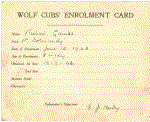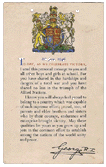Rose Cottage We moved into Rose Cottage in the summer of 1938 when I was just three years old and Mum was expecting my sister Mavis. Our next door neighbours in Lavender Cottage were Mr and Mrs Boyd with their two children, Mick and his elder sister Sheila. Mick and I were about the same age and we became good mates and our friendship has lasted to this day, even though Mick now lives in Cumbria. Further down the path towards the lane lived Mr and Mrs Greenwood. Mr Greenwood suffered the misfortune of breaking his leg at his work which resulted in complications and it had to be amputated. He amazed everybody by making himself an artificial leg from a branch of his apple tree because he couldn't get on with the one provided by the hospital. His home-made leg was shaped like a very large catapult prong which he somehow fitted to his "stump" and he claimed he could run for a bus with it. A little further up the lane lived Mr. Pudduck[1] who ran a small delivery business dealing in dry groceries, fish and sometimes fruit. Being situated near to us I was often sent to his house to get the odd jar of paste or tin of something if it was available. Every Sunday morning I had to go to Sunday school at the Congregational Chapel next to The Homestead on Willey Green corner. It was run by Mr Coleman who lived near the Anchor pub, and Dorothy Appleby who played the harmonium. There were regular prizes for attendance which of course attracted membership as did the occasional parties with the promise of extra sweets, which during wartime was a real treat. I can still recall the words of All Things Bright and Beautiful that I used to sing solo most weeks even though loud remarks like "Oh! Not again" were designed to stop me.
These solo efforts generated much needed hilarity and morale-boosting but were brought to an end by the eventual "all clear" siren much to the relief of the staff. There were quite a few other children at the school from Bailes Lane. They included my cousin John Gunner, Peter and Bernard Hobbs, Brian (Bones) Jones and his sister Maureen, Roy and Cyril Bentley, Brian (Whitewash) White, and Raymond and Patsy Crooke[2] (siblings of Ronald Crooke). From Willey Green there was Ken (Brum) and Doreen Burningham, Jean Brown, Les and Tony Bayliss plus a few others whose names I'm afraid escape me.
I had lots of uncles serving in the armed forces, five of whom were brothers of my mother. One of them - my Uncle Dick Lody - was wounded whilst serving with the 8th Army in North Africa, and another, Uncle Charlie Henman (married to my mother's sister Barbara), was on HMS Ark Royal when it was sunk in the Mediterranean, from which fortunately he survived. But in December 1941 the momentous news that Hitler had declared war on the U.S.A,[3] following the Japanese attack on Pearl Harbour, presented Britain with an ally of colossal power that warmed the hearts of the whole nation, creating an enormous feeling of renewed confidence and security that seeped down from the parents to us the children. A few days later, school broke-up for the Christmas holidays. It was a very exciting time and I could hardly wait for Christmas Eve to arrive. I was very much aware though of the effects of war even at my young age, and how many items of food were scarce and the luxury of extra sweets and chocolate were unknown to me. I knew from experience whilst shopping in Guildford with my Mum the tedium of queuing for almost everything, and the bitter disappointment when supplies of a few extra food items ran out, but she did her very best from very limited resources to keep a good table and both I and my small sister Mavis were rarely hungry.
"Have you heard the great news?" said Mrs Parris one morning. "Montgomery and the 8th Army have won a big victory over the Germans in North Africa. Apparently Rommel's army has been smashed and they are retreating everywhere." "Hooray, thank God for that, good old Monty, and some good news at last," said my Mum. After school that day I and my friend Mick walked home with Mick's elder sister Sheila instead of catching the bus. This meant we had a spare penny that we could spend at Carpenters the bakers on the way. Sometimes there were little jam rock cakes left over from the day before and you could get three for a penny, but you had to brush off the mouse droppings before you could eat them. Some of the boys also said that Mr Carpenter dribbled in his cake mix when he was making them, but I was hungry and liked jam rock cakes, so I didn't care even if it were true. As we reached the little footpath by Tickners bridge that led up to our homes I saw my Mum waiting there, while several other people were standing at the end of their gardens looking towards the bus stop outside the Duke of Normandy pub. I could see that my Mum was crying and I ran up to her to find out what was wrong. She hugged me and said, "There's been an awful accident, Ronald Crooke has been run over by an army lorry and killed. He ran out from behind the school bus straight in front of the lorry; he didn't have a chance." Mum was sobbing as she hung on to me. Mick and I looked at each other sorrowfully; we had both been to Ronald's birthday party earlier in the year. He was a couple of years younger than us and had only just started school. Slowly and tearfully we all walked home, the world at that moment a dreadful place to be. The whole village grieved for Ronald. The utter devastation to his family was unimaginable and he was buried at the parish church of St Mary's, Worplesdon.
The men were mostly all olive skinned and dark haired with brown smiling eyes, not at all like the enemy we had imagined and we tried to answer their questions, not always understanding their broken English. I remember looking at what they were eating and was amazed to see slices of fruitcake amongst their sandwiches, a luxury I rarely had. One of the prisoners, noticing my envious look, offered me a piece of his cake for which I thanked him before devouring it hungrily. The prisoner then pulled a shabby wallet from his pocket and showed me a photo of a young boy about my age and, when I asked who it was, he answered in faltering English with a noticeable catch in his voice: "My son in Italia." The prisoners were only working there for a few days so I went to the field as often as I could, helping my prisoner friend pick potatoes and was rewarded with the occasional piece of fruitcake. Mick also had a prisoner friend who used to perform conjuring tricks, and the other prisoners would roar with laughter at our bewilderment after each trick, trying to work out how they were done. My prisoner friend also showed me some of the tokens he had earned for working. Each was marked with a value; a sixpence, a shilling or a penny which they could spend back at the prison camp on little extras as and when available. They were kind, compassionate men and we liked them a lot. Then one day they were gone and no one saw them again. Back at school after the long summer holiday there was an incident that sobered all our thoughts. It was afternoon break-time and the whole school was at play when the noisy chatter of the children slowly hushed as their attention was riveted to the drama unfolding in the sky above them. A returning allied bomber with smoke trailing from its damaged fuselage was limping back towards its base, and the children watched in horrified awe as suddenly the stricken aircraft's exhausted engines failed and it started to fall from the sky. Tiny figures emerged, their parachutes billowing open "mushroom like" as the aircraft fell corkscrewing on its descent to somewhere beyond the trees. Some of the smaller children ran screaming into the school to be comforted by their teachers as the horrific scene faded. We all talked of the incident for days, the sheer drama of it etched indelibly into our minds. Later there was a rumour amongst the boys that the aircraft had crashed near the Hogs Back[4] and that one parachute didn't open and a body was recovered from a depth of three feet in the ground.
The information film this time warned about Butterfly Bombs, which were anti-personnel booby trap devices dropped by the Germans in populated areas. People and especially children were advised to call the police if any were found and not to touch them, because the consequences were often fatal and as the name implied these fiendish devices were made to look attractive to catch people's attention. I though was fascinated by them, and looked forward to telling Mick all about it tomorrow.
"What's happening Mum, why is everyone talking so much?" I queried earnestly. She reached out and held my hand seeing the concern in my eyes. "Something very important is possibly happening today," she said gently, with a noticeable catch in her voice. "Dad and I think the invasion of Europe may have started and a lot of people may die, so we have to say our prayers for them." I remember looking out of the small living room window; the day was quite bright where the previous days had been a little stormy. "Does this mean the war is over then Mum?" I asked. She sighed before replying. "Not yet Michael, but hopefully it shouldn't be too long now." I then went outside, my attention drawn to the sound of aircraft and looking up I was amazed. The sky was alive with masses of fighters and bombers all going in the same direction and I watched in awe at this huge air armada. Just then Mum came out carrying Mavis, and looking up to the sky she lifted her arm and waved a greeting to the aircraft as with deep emotion in her voice she cried out: "Look out Hitler, here they come!" When I arrived at school that morning it was awash with rumour and speculation about what was happening. The teachers kept popping out of their classrooms during the morning seeking news. Eventually the invasion was confirmed later in the morning by an announcement on the wireless to the nation by Richard Dimbleby from a BBC unit based in the village.[5] Special prayers were then said all that week in school and the church.
One of the things we commemorated at school was Empire Day. The day would start with the usual school assembly, then the whole school would gather around the tall flagpole situated in the school courtyard and the Union Jack would be raised. As it fluttered proudly in the breeze prayers would be said for the Empire, after which all the classes would march to Wyke Church where there would be an Empire Day service conducted by the vicar. Then the whole school would have the afternoon off which was the part I liked best of all. One of my favourite uncles, Uncle Joe, used to visit Rose Cottage now and then. He was one of Mum's younger brothers serving in the parachute regiment, and he and his girlfriend Gwen would visit sometimes for tea, which pleased me because the thing I liked most about Uncle Joe was that he could yodel. He could yodel to any popular tune of the day and both I and Mick would listen enthralled at his rich, melodic yodelling as he and Gwen twirled together in our tiny living room. Both of us tried to copy his yodelling, but Mum would get fed up with it and tell us to shut up. One day Gwen came over on her own to visit Mum, crying all the time and continually asking Mum did she think that Joe still loved her because he had gone away without saying goodbye. Mum tried to comfort Gwen by saying she felt sure that Joe still loved her and that the war was to blame. We learned later that he had been parachuted into France on D-Day and had been wounded but survived, but I never saw Gwen again.
The war was going very well now for the allies in Europe who were advancing
quickly on all fronts. It was very late one evening in early May and I was sound asleep in bed when I was awakened by the sound of my Mum calling out to me. "Michael, get dressed and come downstairs as quickly as you can, there's a lovely surprise for you." Although barely half awake I hurriedly dressed and raced downstairs, my mind whirling in anticipation at Mum's excited call. "They are lighting a bonfire on the green," she said breathlessly. "Hurry or we'll miss it." We ran quickly along the path to the lane and along to the green where we saw flames leaping from a tangled mass of hurriedly arranged brushwood. I looked on in wonder because I had never seen a real fire outside at night before, at least not that I could remember. I could hardly take it all in, it was something like a dream and I called out excitedly, "Mum, what's happening, what's it for?" Turning to me with tears in her eyes and her voice trembling with emotion she said, "It's the war Michael, we have won the war against Germany; it's all over."
After almost six long years of war, certainly as far back as I could remember, it seemed a new beginning had started. The village was at peace. Michael Gaines
|

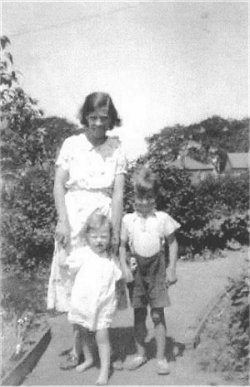
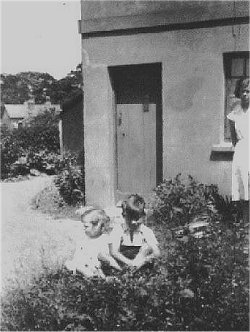
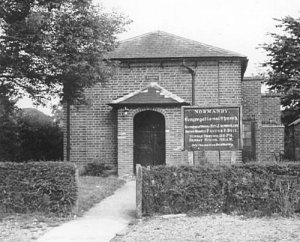
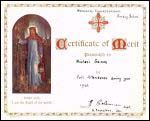
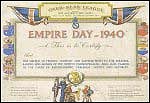
 School and Saucy Sing Songs
School and Saucy Sing Songs
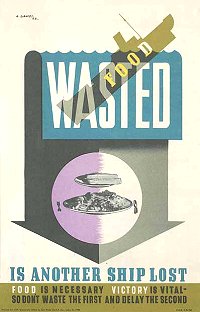 It was a momentous time of
the year for the country. Although the threat of invasion had receded for
the time being, the War hadn't been going too well for Britain. With heavy
convoy losses at sea by U-Boats the nation was in real danger of being starved
into submission and food rationing increased all the time.
It was a momentous time of
the year for the country. Although the threat of invasion had receded for
the time being, the War hadn't been going too well for Britain. With heavy
convoy losses at sea by U-Boats the nation was in real danger of being starved
into submission and food rationing increased all the time.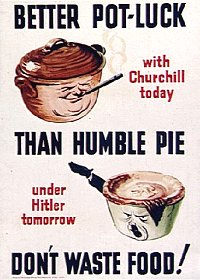 It was late summer of
1943 towards the end of the school holidays, and in Turners field opposite
the Duke of Normandy pub there were groups of men busy potato picking;
but they weren't ordinary farm workers. They all wore the same brown coloured
overall type clothing with large yellow patches sewn on the back, and there
were others that looked like police with rifles who seemed to be guarding
them. My Dad, who worked at the Vokes factory, mentioned that he had seen
them working there the day before and thought they might be Italian prisoners
of war. Mick Boyd and I went into the field to see what was going on and
just at that moment the prisoners stopped work for lunch and some of them
called out to us, gesturing us to come over to meet them. The guards didn't
seem to mind so we walked rather self-consciously over to the group of
prisoners who had called out and sat down with them.
It was late summer of
1943 towards the end of the school holidays, and in Turners field opposite
the Duke of Normandy pub there were groups of men busy potato picking;
but they weren't ordinary farm workers. They all wore the same brown coloured
overall type clothing with large yellow patches sewn on the back, and there
were others that looked like police with rifles who seemed to be guarding
them. My Dad, who worked at the Vokes factory, mentioned that he had seen
them working there the day before and thought they might be Italian prisoners
of war. Mick Boyd and I went into the field to see what was going on and
just at that moment the prisoners stopped work for lunch and some of them
called out to us, gesturing us to come over to meet them. The guards didn't
seem to mind so we walked rather self-consciously over to the group of
prisoners who had called out and sat down with them.
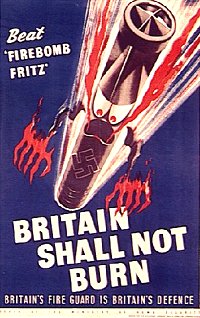 On a Monday Mum
sometimes took me to the cinema if there was a good film on. Nearly all
the adults in the cinema smoked cigarettes, Mum included, and the light
beam from the projector would cut through the dense smoke haze like a searchlight,
twisting and dancing in tune with the different images as they passed through
the projector lens. There were normally two feature films shown, one the
main feature, the other a "B" grade film or sometimes a cartoon,
and always between the two was "The Gaumont British News." This
showed the latest war news in graphic detail with an upbeat commentary,
which helped raise morale considerably. Sometimes there would also be a
public information film advising the public about the do's and don'ts to
aid the war effort such as: "Coughs and Sneezes Spread Diseases,"
with animated German paratrooper germs landing on anything and anybody.
I loved these animated cartoons and features especially if they were in
colour, which unfortunately was rare.
On a Monday Mum
sometimes took me to the cinema if there was a good film on. Nearly all
the adults in the cinema smoked cigarettes, Mum included, and the light
beam from the projector would cut through the dense smoke haze like a searchlight,
twisting and dancing in tune with the different images as they passed through
the projector lens. There were normally two feature films shown, one the
main feature, the other a "B" grade film or sometimes a cartoon,
and always between the two was "The Gaumont British News." This
showed the latest war news in graphic detail with an upbeat commentary,
which helped raise morale considerably. Sometimes there would also be a
public information film advising the public about the do's and don'ts to
aid the war effort such as: "Coughs and Sneezes Spread Diseases,"
with animated German paratrooper germs landing on anything and anybody.
I loved these animated cartoons and features especially if they were in
colour, which unfortunately was rare.
 A
few days later during a break time on the school playing field I suddenly
heard the sound of someone yelling out at the top of his voice; it was Jack
Barclay one of the senior boys. "Get down everybody, down flat,"
he screamed to all the children on the playing field as a deadly Doodlebug
A
few days later during a break time on the school playing field I suddenly
heard the sound of someone yelling out at the top of his voice; it was Jack
Barclay one of the senior boys. "Get down everybody, down flat,"
he screamed to all the children on the playing field as a deadly Doodlebug